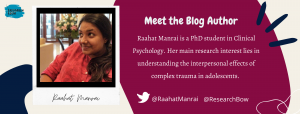Annual reviews are deemed important points of progression during the PhD journey.

In addition to being a progression review, the annual review helps to support students to successfully continue and complete their PhD journey. For first–year PhD students, annual reviews may be considered one of the most important points in their year, more so than subsequent annual reviews. They are one of the two major points of review for a first–year doctoral candidate, the first being 10-week report. Possible outcomes of the review mainly include: (1) confirmation of registration for PhD and progression to year 2, (2) repeating the review within 3 months, or (3) registration to a different programme like an MScR or discontinuation of registration entirely.
With Annual Review frenzy right around the corner and most first–year PhD students eagerly waiting for their assessments, here is a pocket guide to ‘survive’ the first-year annual review.
1. Keep the timeline of your review in mind-
Annual reviews typically occur between 9 to 12 months of the programme starting date. Hence, it is advisable to keep in mind the timeline for the first year and plan accordingly.
2. Follow the proper procedure of the Annual Review-
Each subject area within the School might have slightly different procedures when it comes to conducting the annual review; however, it generally consists of finalizing the date of the review, filling out a form on EUCLID (in the Student Record section in MyEd), submitting a paper before the said date, and giving a short presentation on the day of the review (although not required, but most reviews involve some form of presentation).
For more details about the procedure of the Annual Review, please visit: https://www.ed.ac.uk/files/atoms/files/copsupervisorsresearchstudents.pdf
3. Ensure open channels of communication with the supervisors-
All PhD students are, at a minimum, allotted two supervisors—both a primary and secondary supervisor or co-supervisors. The supervisory team is one of the most important support structures throughout one’s PhD progression. It is imperative (and cannot be stressed enough) to maintain honest and open communication with one’s supervisory team at all times. If you are facing any problem or feeling overwhelmed, they should be the first people to know about it.
I think you can’t help but compare yourself to other PGRs, but it is really important to remember that every supervisor and critical friend has different expectations and preferences. Definitely talk to your supervisory team and your critical friend about how to organize the review process! For some it might be more formal, but my Annual Review was very casual and more of a conversation with colleagues. -Anonymous 1
4. Maintain consistency-
Now, we all know that we never end our PhD’s with the same research topic that we start with, rather, it is a whole process of evolution and deliberation of thoughts and ideas. However, in cases where we wish to make a radical change from one research interest to another, it is advisable to consult one’s supervisory team before doing so because, in some cases, they might not specialize in the changed/ suggested research topic or they would want to include other supervisors on the team to better assist with the new research topic; thus, it’s always best to keep them in the loop.
I was very surprised, and pleased, when by the time I had to present my annual review, I realized my project had slightly changed from what I initially proposed. This process was a bit scary, but my supervisors told me that it was natural and even expected to have a change in thoughts during the whole process of the PhD. The first year wasn’t an exception, as they expected refinement of the project and a more critical development of it. In my case the core topic was the same, but the intricacies of it and the methodology is what changed. -Anonymous 2
5. Critical Friend-
As part of the annual review process, each PhD student gets a ‘critical friend’ allotted to their research. The Critical Friend will be involved with the supervision team in reviewing the annual progress and might offer occasional advice to the student regarding the project during the following years. One of the most important roles of the critical friend is to provide feedback following the first-year annual review and subsequent annual reviews. The critical friend is someone the student can speak with if they are facing difficulties in supervision that they would like support with.
In my particular case, having a critical friend provided a sense of stress as you are showing your project to an external person for the first time, but also, when I knew her expertise in both the topic and the methodology, I felt relieved as I knew her feedback was going to make my project more rigorous and rich. -Anonymous 2
6. Keep in constant touch with the PGR community-
The PhD journey can become quite isolated, especially when one’s colleagues are also consumed by their own research projects; however, it is important, especially during unprecedented uncertain times, to consistently interact with other PhD students to know that you are most definitely not alone! The school has appointed ‘PGR Reps’ who are designated to address concerns of the rest of the PGR community—while they cannot actively help your concerns or change your situation, they can definitely provide a signpost in the right direction.
I did a peer-presentation for my 1st year review and attended a couple. The PhD students who had been through the process gave some feedback and asked a few questions. I asked some people to read my first-year review draft, give me their comments and I also asked a couple of them to share their first-year review documents. -Anonymous 3
One of the best advices I got from my peers and supervisors was to write small pieces of thoughts, paper summaries and rationales for decision making processes since the very beginning of my PhD as this would be material you can always refer to when you present your annual review. It will give structure to your thoughts and will bring more material to your PhD. Keeping a journal of your activities and small pieces of writing is a good practice whilst doing a PhD. –Anonymous 2
7. Be realistic in your approach-
While it is easy to get carried away with your project—because let’s be real, it is our baby in the making—it is essential to be realistic. Keeping in mind both project feasibility and situational circumstances is important. It is highly important to be pragmatic about timelines and, if you tend to get overwhelmed, do not hesitate to apply for extensions and special circumstances. The school provides a lot of resources for the same.
When I was in my first year, my supervisors asked me how many PhDs I was intending to do. You probably can’t change the whole world with your project, but you can do it in a way that it changes you – use your PhD to learn new skills and to challenge yourself! I had to learn that a well-designed project about a small topic area is better than a big superficial project. -Anonymous 1
8. Maintain a healthy work-life balance-
All work and no play makes Jack a dull boy! Getting a PhD is a long journey; hence, it is highly important to maintain a life outside your PhD and research. Indulging in other activities and hobbies will not only relax you but also help instill some transferable skills which can prove to be important both for personal and professional development. So, it is imperative for you to have a life outside the office, something which doesn’t involve your research and help you unwind.
Very often you hear stories (I know I did) that most of the first annual review ends up being your first chapter, but this puts a lot of pressure to produce something that is ‘PhD Thesis’ quality. The reality is that PhDs are dynamic, literature is dynamic, so there is no way you can just copy paste your 1st annual review in your first chapter 3 years later, and that’s ok. Don’t see your annual review as a PhD chapter. See it as a work in progress! -Anonymous 4
Remember, the above list is quite explorative, and there is no ‘One Size Fits All’ formula. The University has an Advice Place (https://www.eusa.ed.ac.uk/support_and_advice/the_advice_place/) to help students address both academic and non-academic concerns. While everyone has different plans of action or support which might work for them, this small list of simple ‘do’s and don’ts’ might come in handy for those who are going to appear for their annual review in the coming months. Although the first year review may seem quite daunting and stressful, it acts as an important reality check for the students to plan out the subsequent years; getting feedback from both the supervisory team and the critical friend, proves quite useful for the rest of the years to come.
To learn more about the Annual Review Process, please click on the link below (EASE Login Required): https://www.learn.ed.ac.uk/webapps/blackboard/content/listContent.jsp?course_id=_17186_1&content_id=_617596_1





Many thanx for sharing this!